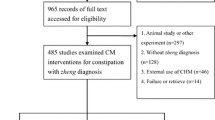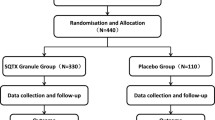Abstract
Background
Syndrome is one of the most important concepts in Chinese medicine (CM) theory. However, it was not well accounted in most of randomized controlled trials (RCTs).
Objectives
To determine whether CM syndrome differentiation affects the treatment results, functional constipation (FC) was selected as a target disease, and MaZiRenWan (麻子仁丸, MZRW), a classic CM formula commonly used for constipation with excessive heat syndrome, was selected for study.
Methods
It is an 18-week prospective double-blinded, doubledummy RCT, including 2-week run-in, 8-week treatment and 8-week post treatment follow-up. A total of 120 FC patients diagnosed as excessive heat syndrome will be recruited from the First Teaching Hospital of Tianjin University of Traditional Chinese Medicine and the Baokang Affiliated Hospital of Tianjin University of Traditional Chinese Medicine. Patients will be randomly allocated into fixed MZRW (f_MZRW) granule group, modified MZRW (m_MZRW) granule group or bisacodyl group. For m_MZRW group, no more than two herbal granules can be added according to the syndrome differentiation for individual participants. The primary end point is the mean of complete spontaneous bowel movements (CSBMs) per week during the treatment period. Secondary end points include mean of CSBMs per week during follow-up, stool form, global symptom improvement, constipation and constipation-related symptoms assessment, CM syndrome change, and reported adverse events.
Discussion
This trial is designed to evaluate the effectiveness of these three interventions for FC patients with the CM syndrome of excessive heat, and to determine the change of CM syndrome and the progress of disease during the treatment course. The results are important to explore whether syndrome differentiation is important for the therapeutic effect of a formula on a disease. [Trial registration: Chinese Clinical Trial Registry (Reg No. ChiCTR-TRC-13003742); protocol version: MZRW/NSFC-81173363 (2015.05.04)]
Similar content being viewed by others
References
Schulz KF, Altman DG, Moher D, CONSORT Group. CONSORT 2010 statement: updated guidelines for reporting parallel group randomized trials. Ann Intern Med 2010;152:726–732.
Chen KJ, Qian ZH, Zhang WQ, Guan WR, Wu XG, Chen XJ, et al. Effectiveness analysis for double blinded treatment with refined coronary tablets on angina pectoris leaded by coronary heart disease in 112 cases. J Med Res (Chin) 1982:24–25.
Wang G, Mao B, Xiong ZY, Fan T, Chen XD, Wang L, et al. The quality of reporting of randomized controlled trials of traditional Chinese medicine: a survey of 13 randomly selected journals from mainland China. Clin Ther 2007;29:1456–1467.
Bian ZX, Moher D, Dagenais S, Li YP, Wu TX, Liu L, et al. Improving the quality of randomized controlled trials in Chinese herbal medicine, part: applying a revised CONSORT checklist to measure reporting quality. J Chin Integr Med (Chin) 2006;4:233–242.
Yan J, Engle VF, He Y, Jiao Y, Gu W. Study designs of randomized controlled trials not based on Chinese medicine theory are improper. Chin Med (Chin) 2009;4:3.
Wu ZG. Exploring the clinical research methods for integrated traditional and Western medicine. Chin J Integr Tradit West Med (Chin) 2010;30:1016.
World Health Organization Western Pacific Region. WHO international standard terminologies on traditional medicine in the Western Pacific Region. 2007. Available at http://www.wpro.who.int/NR/rdonlyres/14B298C6–518D–4C00–BE02–FC31EADE3791/0/WHOIST_2 6JUNE_FINAL.pdf.
Cheng CW, Kwok AO, Bian ZX, Tse DM. The quintessence of traditional Chinese medicine: syndrome and its distribution among advanced cancer patients with constipation. Evid Based Complement Alternat Med 2012;2012:739642.
Cheng CW, Bian ZX, Zhu LX, Wu JC, Sung JJ. Efficacy of a Chinese herbal proprietary medicine (Hemp Seed Pill) for functional constipation. Am J Gastroenterol 2011;106:120–129.
Drossman DA, Corazziari E, Delvaux M, eds. Rome: the functional gastrointestinal disorders. 3 ed. McLean: Degnon Assoc;2006:516.
Zhang BY, Dong JH, Zhou ZY, eds. Internal medicine of Chinese medicine. 5th ed. Shanghai: Shanghai Scientific and Technical Publishers;1985:171.
Ministry of Health of the People’s Republic of China. Clinical research guidelines for new drug of Chinese medicine. Beijing: Ministry of Health of the People’s Republic of China;1993:131–133.
The State Administration of Traditional Chinese Medicine of the People’s Republic of China. Criteria of diagnosis and therapeutic effect of diseases and syndromes in Chinese medicine. Beijing: Nanjing University Press;1994:18.
Zhu YP. Chinese materia medica: chemistry, pharmacology, and applications. Amsterdam: Harwood Academic;1998:117–120, 127–135, 157–161, 231–239, 304–306, 372–378, 407–409, 412–414, 496–498, 564–567, 587–590, 629–632.
Chinese Pharmacopoeia Commission. Pharmacopoeia of the People’s Republic of China. Beijing: Chinese Medical Science Press; 2010:44, 48–49, 60–61, 63–64, 87, 120, 199–200, 268–270, 302–303, 306–307, 360–361, 372–373, 375–376, 384–386, 399–400, 418–419.
Portalatin M, Winstead N. Medical management of constipation. Clin Colon Rectal Surg 2012;25:12–19.
Parkman HP, Rao SS, Reynolds JC, Schiller LR, Wald A, Miner PB, et al. Neurotrophin–3 improves functional constipation. Am J Gastroenterol 2003;98:1338–1347.
Jiang M, Lu C, Zhang C, Yang J, Tan Y, Lu A, et al. Syndrome differentiation in modern research of traditional Chinese medicine. J Ethnopharmacol 2012;140:634–642.
Shea JL. Application of evidence–based medicine in Chinese medicine: debate and strategy. Chin J Integr Tradit West Med (Chin) 2010;30:233–236.
Li JH, Wang JL, Cui M. Quality assessment researches of clinical trials on Chinese medicine: current situation and method of analysis. Chin J Inform Tradit Chin Med (Chin) 2008;16:95–98.
Lai SL. General contemplation on causality in appraising clinical efficacy of traditional Chinese medicine. Chin J Integr Tradit West Med (Chin) 2005;25:293–296.
Li GS. Thoughts on the reasonable application of "Clinical Research Guidelines for New Drug of Chinese Medicine" from the perspective of technical assessment. Tradit Chin Drug Res Clin Pharm (Chin) 2008;19:319–321.
Liu BY. Present situation and prospect of the study on clinical effectiveness evaluation of Chinese medicine. Bull Natl Nat Sci Found China (Chin) 2010:268–274.
Liu BY, Li HJ, Ho LY, Zhu WZ, Hu JQ. Research progress on the efficacy evaluation of syndromes. J Tradit Chin Med (Chin) 2009;50:397–400.
Author information
Authors and Affiliations
Corresponding author
Additional information
Supported by the National Natural Science Foundation of China (No. NSFC-81173363)
Electronic supplementary material
Rights and permissions
About this article
Cite this article
Cheng, Cw., Zhang, L., Zhao, C. et al. Whether Syndrome Differentiation Affects Treatment Result: Study Protocol of MaZiRenWan (麻子仁丸) for Functional Constipation in A Randomized Controlled Trial. Chin. J. Integr. Med. 25, 175–181 (2019). https://doi.org/10.1007/s11655-018-2848-y
Accepted:
Published:
Issue Date:
DOI: https://doi.org/10.1007/s11655-018-2848-y




